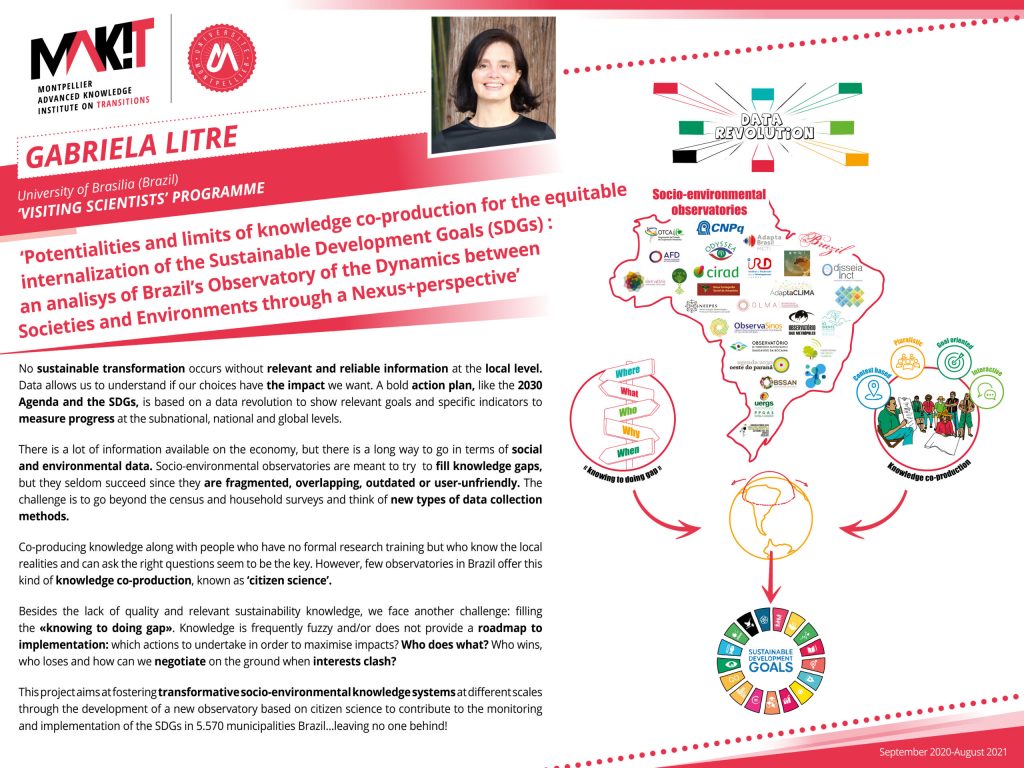Gabriela Litre
Gabriela Litre is a full Associate Researcher on global environmental change and public policies, and the Executive Co-Editor of the scientific journal Sustainability in Debate (SeD) at the Centre for Sustainable Development of the University of Brasília (CDS-UnB).
Coordinator of the Knowledge Transfer Working Group of the Socio-Environmental Observatory of the National Institute of Science and Technology (INCT Odisseia), she is also a research member of the Brazilian Research Network on Global Climate Change (Rede Clima) and of the Scientific Network on Sustainable Livestock Production of the Post-graduate Programme on Rural Development of the Federal University of Rio Grande do Sul, Brazil.
With a double PhD in Geography (Université Sorbonne-Nouvelle- Paris 3) and Sustainable Development (CDS-UnB), Dr. Litre is specialized in participatory processes and knowledge co-production for climate change adaptation and the nexus between food, energy and water security. In this regard, she is a technical advisor to several Brazilian ministries and agencies, including the Brazilian National Water Agency and the Brazilian Ministry of the Environment, where she is the leading Technical Expert for evaluating and monitoring Brazil’s National Climate Change Adaptation Plan.
A social communicator by training, she was, during the first phase of her career an award-winning political and education correspondent for Argentine’s newspaperLa Nación, before joining the UN peacekeeping mission in DR Congo and the International Human Dimensions Programme on Global Environmental Change of the United Nations University (UNU) in Bonn, Germany.
Promoted by UN agencies as a key approach to the implementation of the Sustainable Development Goals (SDGs), the widely disseminated water-energy-food security nexus frequently fails to consider the lack of information transparency in the Global South. Traditional means to gather data (i.e. household surveys) are often inconsistent or politically manipulated. The lack of reliable public information to analyse, not only the synergies and trade-offs among water, food, energy and health public policies, but also territorial disputes, clearly emerges as an obstacle for local actors willing to transition to more sustainable livelihoods.
Knowledge co-production processes appear as a strategic tool for SDG implementation. They offer a powerful alternative for aligning knowledge and action and recalibrate goals, from dealing with proximal problems and quick fixes towards more explicitly targeting the underpinning, ultimate political and territorial drivers of current socio-environmental vulnerabilities, including the current COVID-19 pandemic (Nexus + approach).
For the last decade, Socio-Environmental Observatories (SEOs) have been envisaged as key instruments for fostering ‘co-produced’, transdisciplinary, transferable and scalable knowledge on sustainability. They are vital for tracking progress towards the SDGs through the production of high-quality, timely and accessible data, often in areas or for sectors where little or no data exists today, such as in most of the small to medium municipalities in Brazil, a country marked by deep inequalities.
Capitalising upon previous studies withRede CLIMAand theINCT Odisseia/Odyssea H2020-RISE, the main objective of this project is to consolidate one single Observatory of the Dynamics Between Societies and the Environments whose role will be to triangulate territory-based co-produced knowledge along with socio-environmental data mining to monitor the implementation of the SDGs at the municipal level in Brazil. Specific research objectives are to address both (i) the need to effectively downscale socio-environmental change global models to resolutions useful for local climate adaptation, and (ii) to open the way for context-based, co-produced knowledge to be effectively up-scaled to enrich global climate, food, energy and health models.
